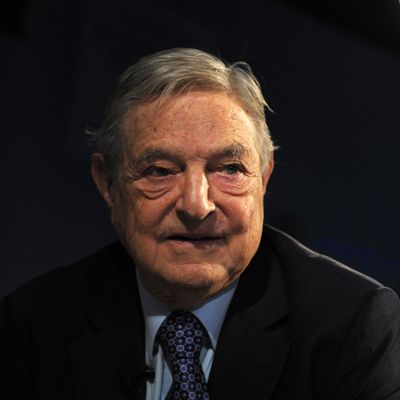
Legendary hedge-fund manager George Soros seems to have had a pretty good idea of what a Brexit would do to world markets — and how he could profit from it. Four days before British citizens voted to leave the European Union, the 85-year-old investor, philanthropist, and political activist, warned against the Brexit, saying it would usher in a “Black Friday” in the markets and a crash of the British pound, with serious consequences for the average citizen.
Only speculators — people like himself and other billionaire investors — would win if the U.K. exited the EU, he wrote in an op-ed in The Guardian on June 20. As the surprise vote to leave came in late Thursday night and early Friday, Soros was looking prescient. The British pound was tanking against the dollar, touching a 30-year low Friday morning. Global markets were in free-fall, with the Dow Jones Industrial Average closing down 600 points. Gold, which investors buy in times of uncertainty and fear, was soaring to a two-year high of $1319 per ounce.
Soros, who was already worth $25 billion before Friday, looks set to make another windfall similar to that which earned him his reputation in 1992, when he famously “broke” the Bank of England. He made $1 billion — a record sum at the time — betting against the pound, which forced the central bank to devalue the currency by 15 percent. He is one of an older generation of hedge-fund managers who’ve made their bones by taking swaggering bets on currencies in something of a geopolitical-economic game of Risk. Called “macro” managers, they’ve faced a rocky road since 2008, with central banks continuing to confound their bets against the euro. This year, they have piled into gold and lost money betting against the U.K. pound on Brexit fears — both bets that paid off in a big way in the wake of Brexit.
After losing money in January’s market swoon, Soros, who had been retired for years, returned to trading at Soros Fund Management, which is now a family office investing his personal fortune. He turned bearish, railing against China and buying gold, selling billions of dollars of stocks and betting on more market turmoil. Though Soros’s exact position on the British pound isn’t known, public filings show he was positioning himself well for Armageddon. He loaded up on gold-mining shares during the first quarter, buying $264 million worth of Barrick Gold, the world’s largest gold miner. He also acquired 1.1 million options to buy the popular exchange-traded fund, GLD, that tracks the price of gold. His stock holdings dropped by 37 percent to $3.5 billion at the end of March, and he doubled his bets on a decline in the S&P 500, according to a quarterly public filing.
Another star macro-fund manager, former Soros deputy Stanley Druckenmiller, has been one of the most outspokenly bearish of the group this year. Speaking at a major investment conference in May, he recommended investors sell all their stocks. He also recommended loading up on gold, as did hedge-fund bigwigs Paul Singer of $26.5 billion Elliott Management and Ray Dalio of Bridgewater Associates, the world’s largest hedge fund with $150 billion. When Druckenmiller was asked Friday what he thought of Brexit by financial reporter Andrew Ross Sorkin, he replied “GREAT” in an email, Sorkin reported on CNBC.
Two British hedge funds already reported big gains on Brexit. Winton Capital, whose founder David Harding had lobbied against Brexit, was up 3 percent as of Friday morning, and Crispin Odey, who had conducted his own private poll ahead of the vote and was in favor of Brexit, gained more than 15 percent in his flagship hedge fund on Friday, according to press reports.
Another macro-fund manager seems to have been set up for a big payoff. In late April, Andrew Law, chief executive of $7.9 billion Caxton Associates, which was founded by billionaire Bruce Kovner, told The Wall Street Journal that “the short sterling trade” — that is, betting against the pound — “could be overcrowded” and noted that the position was hurting his fund. Law said he planned to continue to hold onto his short though, thinking the pound could fall to $1.30. (By noon Friday, it had fallen to $1.36, a 9 percent drop for the day.) Soros predicted it could go as low as $1.15, which would be a 30 percent drop from its value before the Brexit vote.
Another big-name investor got the vote wrong — but still may have made money. Jeffrey Gundlach, CEO at DoubleLine Capital, who has earned the moniker of “bond king” in recent years as he now oversees $100 billion in bonds, said a week ago he didn’t think people would vote to exit, basing his view on Scotland’s recent vote to remain in the U.K. He said hedging against a fall in the pound would be a waste of money, as the cost had gotten too expensive.
“Nobody knows what would happen anyway,” said Gundlach. But even though he believed the U.K. would remain part of the EU, the bond maven told Reuters Friday that his firm sold all of its European equities position before the market closed Thursday as they’d gotten pricey on expectation that voters would decide to stay in the EU.





























